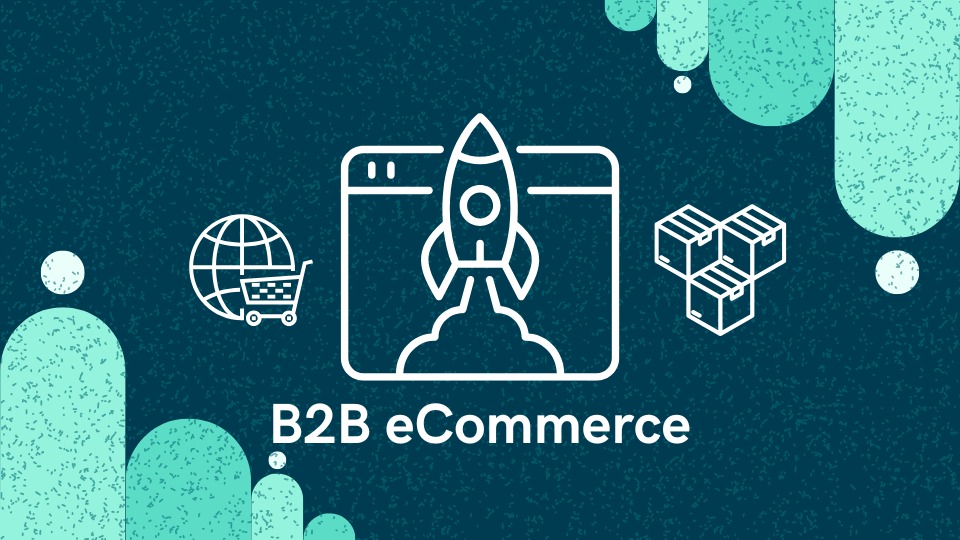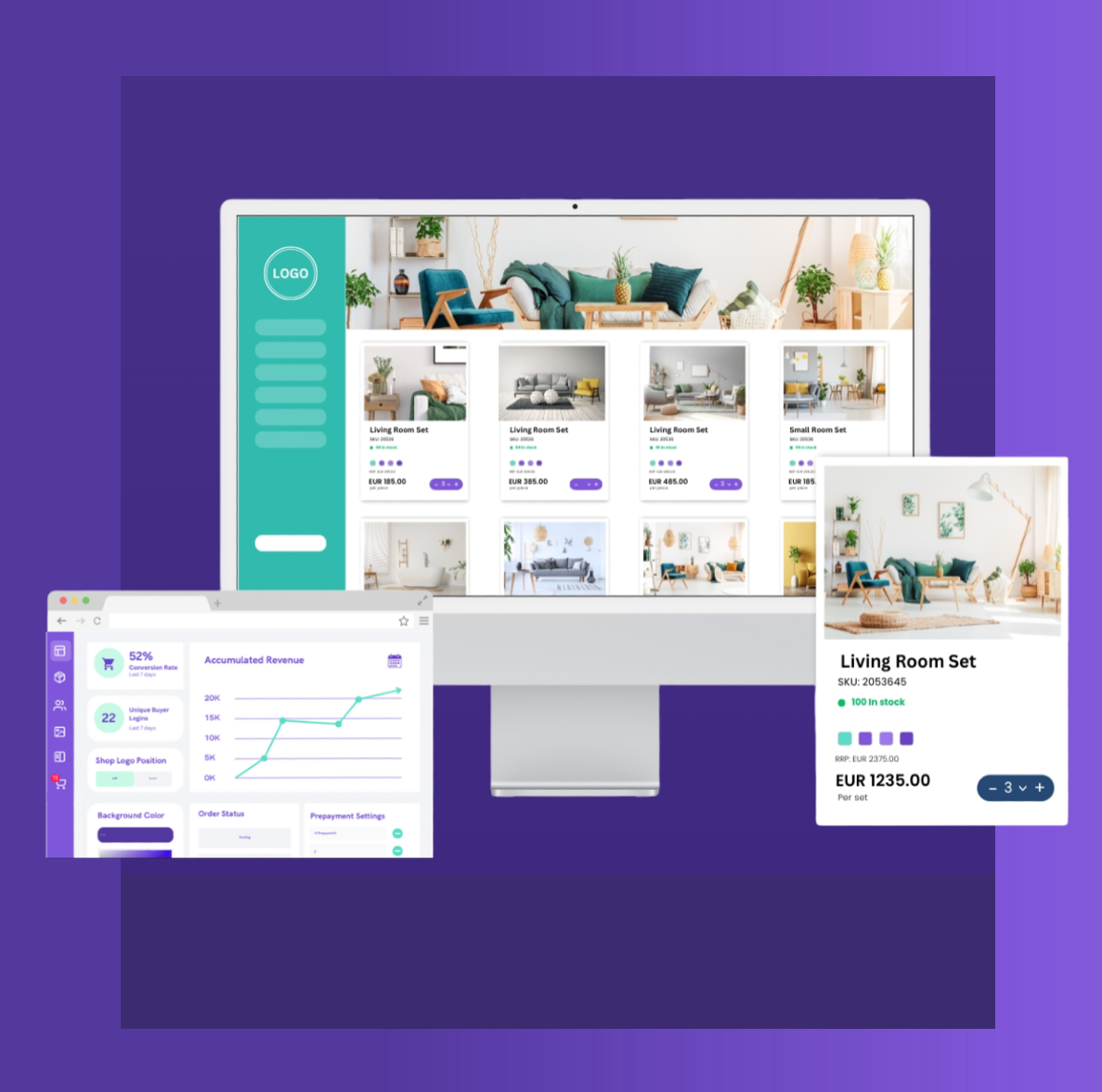The easy B2B eCommerce setup for small brands: What you need to get started
Learn how integrating the right systems can help your B2B eCommerce business save time, reduce errors, and drive growth by creating a seamless, automated workflow.

Starting your B2B eCommerce business starts with the right setup. As a small brand, having the right tools and systems in place can make all the difference in running a smooth and successful operation. From managing orders and inventory to streamlining shipping and accounting, creating a connected ecosystem is the key to saving time, reducing errors, and delighting your customers.
You’ve likely heard terms like ERP, accounting software, and shipping integrations tossed around. While they might sound technical, these systems are actually the building blocks of a well functioning B2B eCommerce machine. When they work together seamlessly, they give you the foundation to focus on growing your business instead of juggling day-to-day tasks.
So, what exactly does a basic B2B eCommerce setup look like? And how do you make these systems work together without complicating your B2B operations? Let’s break it down into simple terms, with examples to help you get started on the right foot.
How to start a B2B eCommerce business in 7 easy steps: Guide 2025

1. Your B2B eCommerce Platform
This is where all the magic happens. Your B2B eCommerce platform is your online storefront and the center of your B2B operations. It’s where your B2B customers will browse products, place orders, and manage their accounts.
What to look for:
- A platform that’s easy to use for both you and your customers.
- Features like bulk ordering, tiered pricing, and customer-specific catalogs.
- Tools to track orders and communicate with buyers.
With Turis, you get a B2B eCommerce platform designed specifically for brands like yours. It’s packed with all the essential features, is easy to set up, and helps you streamline operations from day one.
2. ERP Integration
An ERP (Enterprise Resource Planning) system is like the central nervous system of your business. It connects different parts of your B2B operations—inventory, B2B orders, production, and even HR—so everything works together seamlessly.
Why it’s important:
- Ensures you never run out of stock (or overstock).
- Automatically updates your eCommerce platform with real-time inventory levels.
- Simplifies workflows by centralizing information.
Example:
If you use an ERP like Microsoft Dynamics 365 or SAP Business One, you can integrate it with your eCommerce platform to keep your product catalog and inventory synced in real time.Example:
Platforms like Turis offer B2B specific features tailored for small brands, like automated wholesale stock and B2B order management.
3. Accounting software
You don’t want to get lost in a sea of invoices, taxes, and payments. That’s where accounting software comes in. It tracks revenue, expenses, and cash flow—all essential for running a sustainable business.
Why it’s important:
- Automatically records transactions from your B2B eCommerce platform.
- Simplifies invoicing and tax reporting.
- Gives you a clear picture of your financial health.
Example:
Tools like QuickBooks or Xero are small-business-friendly and can easily integrate with your eCommerce platform to keep everything in sync.
4. Shipping integration
Shipping can make or break your customer’s experience. Integrating a shipping solution ensures that orders are processed quickly, tracking is accurate, and your customers know exactly when to expect their products.
Why it’s important:
- Automatically calculates shipping costs at checkout.
- Prints shipping labels and tracks packages.
- Reduces errors and speeds up fulfillment.
Example:
Platforms like ShipStation or Shipmondo can integrate with your eCommerce platform to handle all your shipping needs.
5. CRM – Customer Relationship Management
A Customer Relationship Management (CRM) system helps you manage your interactions with buyers. From keeping track of contact details to sending personalized offers, it’s all about building long-term relationships.
Why it’s important:
- Helps you stay on top of follow-ups and order histories.
- Enables personalized communication, like birthday offers or product recommendations.
- Gives you insights into your customers’ preferences and buying habits.
Example:
CRM tools like HubSpot or Zoho CRM are great for small businesses and can integrate seamlessly with your eCommerce setup.
6. B2B Payment gateways
You need a way to accept payments securely and efficiently. Payment gateways handle this for you, making it simple for your customers to pay via bank transfer, credit card, or even local payment methods.
Why it’s important:
- Ensures secure transactions.
- Supports multiple currencies for international customers.
- Reduces manual errors by automating payment processing.
Example:
Popular options include Stripe and Adyen, which can be easily integrated into most eCommerce platforms.
B2B payment gateway: What it is and Turis top 3 options

How integration works
Imagine this:
- A customer places an order on your eCommerce platform.
- Your ERP automatically updates inventory levels and passes the order details to your accounting software.
- The shipping integration processes the shipping label and updates the customer with tracking info.
- Your CRM logs the purchase and sends a thank-you email with a discount code for their next order.
All of this happens without you lifting a finger because your systems are working together.
Why Integration is the key to success
Here’s the secret to making your B2B eCommerce setup work smoothly: integration. When your systems talk to each other—whether it’s your B2B eCommerce platform, ERP, accounting software, or shipping tools—you save time, reduce errors, and create a seamless experience for both you and your customers.
Integrations mean no more juggling between spreadsheets or manually updating inventory after every sale. Instead, your entire workflow becomes automated, so you can focus on growing your business instead of being stuck in the weeds of day-to-day operations.
And here’s the good news: With Turis, integrating your key systems is effortless.
How Turis simplifies integrations
Turis is designed to work with the tools you already use, making it easy to create a fully connected eCommerce ecosystem.
Here’s what makes Turis stand out:
- Built in Integrations: Turis natively integrates with popular ERP systems, accounting software like QuickBooks and Xero, and shipping tools like Shipmondo.
- No Code Needed: You don’t need to be a tech expert to get everything up and running. Turis handles the heavy lifting, so you can connect your systems without a single line of code.
- Scalable Solutions: Whether you’re a small brand or planning to scale, Turis grows with you, ensuring your integrations stay seamless as your operations expand.
- Automated Workflows: From syncing inventory in real time to processing orders and generating invoices, Turis takes the manual effort out of the equation.
Example:
Let’s say a customer places a bulk order for office supplies on your Turis-powered platform. Here’s how the integrations work:
- ERP Integration: Your inventory levels are automatically updated in your ERP.
- Accounting Integration: The sale is logged in your accounting software, and an invoice is generated.
- Shipping Integration: A shipping label is created, and tracking details are sent to the customer.
You didn’t have to manually update a thing—everything happened behind the scenes, thanks to Turis.
Start Small, Scale Smart
If you’re a small brand, you don’t have to invest in everything at once. Start with the basics—your B2B eCommerce platform, accounting software, and shipping tools. As your business grows, you can add ERP and CRM integrations to streamline operations further.
The goal is simple: build a system that saves you time, reduces manual work, and delivers a great experience for your customers.
With the right setup, even small brands can compete with the big players. Ready to get started? Let’s make it happen!

